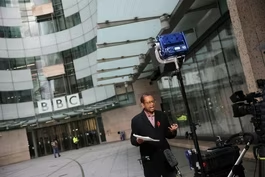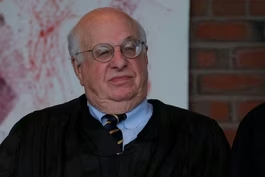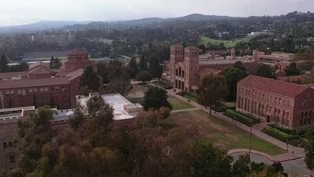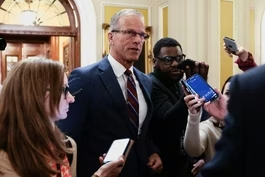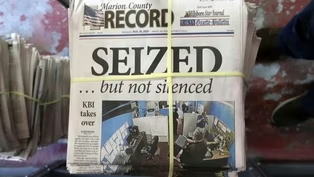
Book explores Edmund Fitzgerald wreck and legend it inspired
Clip: 11/11/2025 | 8m 42sVideo has Closed Captions
'The Gales of November' explores the Edmund Fitzgerald tragedy and the legend it inspired
This week marks 50 years since the SS Edmund Fitzgerald sank while crossing Lake Superior. The shipwreck, which killed all 29 men aboard, became the most well-known wreck to ever occur on the Great Lakes. William Brangham recently spoke with the author of a new book that explores both the tragedy and the enduring legend it inspired.
Problems playing video? | Closed Captioning Feedback
Problems playing video? | Closed Captioning Feedback
Major corporate funding for the PBS News Hour is provided by BDO, BNSF, Consumer Cellular, American Cruise Lines, and Raymond James. Funding for the PBS NewsHour Weekend is provided by...

Book explores Edmund Fitzgerald wreck and legend it inspired
Clip: 11/11/2025 | 8m 42sVideo has Closed Captions
This week marks 50 years since the SS Edmund Fitzgerald sank while crossing Lake Superior. The shipwreck, which killed all 29 men aboard, became the most well-known wreck to ever occur on the Great Lakes. William Brangham recently spoke with the author of a new book that explores both the tragedy and the enduring legend it inspired.
Problems playing video? | Closed Captioning Feedback
How to Watch PBS News Hour
PBS News Hour is available to stream on pbs.org and the free PBS App, available on iPhone, Apple TV, Android TV, Android smartphones, Amazon Fire TV, Amazon Fire Tablet, Roku, Samsung Smart TV, and Vizio.
Providing Support for PBS.org
Learn Moreabout PBS online sponsorshipAMNA NAWAZ: This week marks 50 years# since the S.S.
Edmund Fitzgerald## sank while crossing Lake Superior.
The# shipwreck, which killed all 29 men aboard,## became the most well-known wreck# to ever occur on the Great Lakes.
William Brangham recently spoke# with the author of a new book## that explores both the tragedy and# the enduring legend it inspired.
WILLIAM BRANGHAM: When the Edmund# Fitzgerald first launched in 1958,## it quickly became the pride of the Great# Lakes, a mammoth ship measuring almost## 730 feet from bow to stern.
It made# hundreds of trips, moving mostly tons## of iron ore from mines in Minnesota to# the steel mills of Detroit and Toledo.
On November 9, 1975, the Fitz, as she was known,# took off from a port near Duluth, Minnesota.## It was supposed to be her last run of the# season, but a storm was brewing and headed## for the Great Lakes.
To avoid the worst of it,# the Fitzgerald's captain decided to steer the## ship off its normal course, moving north to# get some shelter along the Canadian shore.
On the afternoon of the 10th, it started# to turn toward Whitefish Point at the far## southeast corner of Lake Superior.
Winds# were gusting up to 100 miles an hour,## pushing what could have been 60-foot# waves.
The Fitzgerald lost its radar,## sustained some structural damage, and# began to list or lean to one side.
Bernie Cooper was captain# of the S.S.
Arthur Anderson,## which was trailing several miles# behind the Fitzgerald that night.
BERNIE COOPER, Captain, S.S.
Arthur Anderson:# Those two seas were the biggest we ever had,## and I just wonder if those two seas# didn't catch up to the Fitzgerald.
WILLIAM BRANGHAM: The night of November 10,# the Edmund Fitzgerald sank in the frigid## waters of Lake Superior, just 17 miles# from safety.
Today, the ship still sits## at the bottom of the lake, more than 500# feet down.
No bodies were ever recovered.
Less than a year after the sinking,# Canadian singer-songwriter Gordon## Lightfoot released his folk ballad# "The Wreck of the Edmund Fitzgerald.
"## The song became a surprise hit, popularizing# the Fitzgerald story with an international## audience and solidifying a legend# that lives on half-a-century later.
It's all recounted in a new book# called "The Gales of November:## The Untold Story of the Edmund# Fitzgerald" by journalist John U. Bacon.
And John U. Bacon joins us now.
John, thank you so much for being here.
There has been a lot written and told# about this story.
I mean, you have said## that this is maybe the most well-known wreck# outside of the Titanic.
So, given all of that,## what was it that you wanted to delve into,# what story you wanted to tell with this book?
JOHN U. BACON, Author, "The Gales of November: The# Untold Story of the Edmund Fitzgerald": The untold## part of my story -- and it's a# gr.. I got to six crewmen who'd been# on the ship before it went down,## because all 29 men went down# with the ship that night,## including two guys who'd been on the ship that# season.
And they could fill in what the captain## was like, what the crew was like, how the ship# functioned.
And I got to 14 of the 29 families to## find out more about their fathers, their cousins,# their uncles, their boyfriends in some cases.
And these guys have never# talked to the press before.
WILLIAM BRANGHAM: Can you give us# a little bit more detail about some## of the examples of those stories that# you -- what you learned from these men?
JOHN U. BACON: I will give you three quick ones.
The captain, Ernest McSorley, 63 years old, the# best in the Great Lakes, he'd been.. since he was 31.
So, that's more than half his# life.
He was going to retire after this trip## at 63.
And he tacked on one more trip for# his bonus for his wife's medical care,## Nellie, who was in 24-hour care# at that point, probably cancer.
So, this trip was a tack-on, and that# makes it all the more heartbreaking,## of course.
We have got Eddie Bindon, 47 years# old, who -- 25-year marriage to his wife, Helen,## and about to retire himself after this trip.
He# had gone the day before on Saturday to Duluth,## Minnesota, right next to Superior, Wisconsin,# to buy his wife a two-carat diamond ring.
And for reasons William will never know, he# gave it not to his duffel bag to take with him## to Toledo, where he's going to see her in three# days.
He gave it to a friend of his and said:## "Please mail this to my wife."
And he did.# And, of course, three days after the wreck,## she received her 25th anniversary ring.# She never took it off.
She never remarried.
So that's a pretty amazing story.
WILLIAM BRANGHAM: Amazing.
JOHN U. BACON, Author, car": The last one,## Bruce Hudson found out two months earlier, he# got his girlfriend.. in Toledo.
He said, don't worry.
We will move in# together and raise the child ourselves.
Of course,## the ship goes down, and Ruth Hudson thinks# she's lost her only child.
She has, of course.
She has no idea that six months later, she's going## to be a grandmother.
So these stories are# the kind of things that make them human.
WILLIAM BRANGHAM: A lot of people might have# come to know this story by the famous Gordon## Lightfoot song.
And you talk a little# bit about how critical that song was to,## in a way, popularizing this.
Can# you tell us a bit about that?
JOHN U. BACON: Let's be honest, William.# Without the song, there is no book.
There are 6,000 Great Lakes shipwrecks# between 1875 and 1975, and everyone knows one,## and it's this one.
It's because of the song.# So the song not only popularized this tragedy,## naturally, but it also put a spotlight on# the entire industry and woke up the industry.
After this, you had better forecasting, better# communications with the captains.
You had,## frankly, more common sense.
When it's rough out,# don't go out, stay in.
They never used to, and now## they always do.
So, since 1975, since that song# came out 1976, there has been not one, not one## Great Lakes shipwreck amongst commercial sailors# since then, versus 6,000 the previous century.
So that's the impact it made.
WILLIAM BRANGHAM: And yo.. JOHN U. BACON: Absolutely.
The song gave it so# much attention that they were writing reports## two and three and four years later, the Coast# Guard, the National Transportation Safety Board,## and, of course, books upon books you can# see behind me that I have been reading.
They're not about the Lusitania.
They're not# about the Bradley that went down in 1958 or the## Cedarville in '65.
It's about this one ship.# So this kind of -- it was 9/11 basically for## the shipping industry, and that forced them to# wake up and do a better job, and now they have.
WILLIAM BRANGHAM: Your book also# sort of pulls the curtain back on## the importance of Great Lakes shipping,# how critical it was to the country,## and how risky it could be.
Can you# just give us a little sense of that?
JOHN U. BACON: This is where your cement# comes from, your car comes from, your food## comes from.
It's all from these ships.
And I did# not fully appreciate that, the reason being is## that shipping is three times more efficient than# trains and six times more efficient than trucking.
It's not even close.
So if they can put it on a# ship, they will.
And it's also more dangerous,## as you pointed out.
Perhaps the biggest# shock to me in all my research is the## simple fact that the experienced sailors# in both the Atlantic and the Great Lakes## will tell you the Atlantic is not# as dangerous as the Great Lakes.
Saltwater squashes down the waves and# spreads them out.
So you get these gentle## roller coasters versus these mountaintops,# basically, that are twice as close together.## Instead of 10 to 16 seconds apart, they're# four to eight seconds apart.
On top of that,## the storm in the ocean is probably from 500# or 1,000 miles away.
In the Great Lakes,## they are called locally occurring storms, which,# William, means the storm over your head right now.
And that can change very quickly.
WILLIAM BRANGHAM: How do you hope that# the country remembers this tragedy?
JOHN U. BACON: Obviously, solemnly.
There## are a lot of jokes out there you# will find on Twitter and so .. But second thing is to understand# that these guys, in my opinion,## were heroes before that night.
Everyone knows# the fisherman, the farmer, the factory worker,## the miner.
No one knows these guys.
But# this is where your stuff comes from,## and at great risk.
It also# should be noted, by the way,## the families didn't know each other at all when# the ship went down, have become incredibly close.
And they said to me, they're not like# family.
They are family.
And one of the## daughters pulled up her sleeve, and it says# "We are holding our own" in a tattoo on her## left forearm.
That was the last word from the# Edmund Fitzgerald: "We are holding our own."
And these families truly are.
WILLIAM BRANGHAM: All right, the book# is called "The Gales of November."
John U. Bacon, thank you so much for joining us.
JOHN U. BACON: William, thank you.
BBC under scrutiny over edit of Trump's speech on Jan. 6
Video has Closed Captions
Clip: 11/11/2025 | 7m 13s | BBC under scrutiny over edit of Trump's speech on Jan. 6 (7m 13s)
Conservative judge resigns, calling Trump uniquely dangerous
Video has Closed Captions
Clip: 11/11/2025 | 8m 31s | Prominent conservative judge resigns, calling Trump 'uniquely dangerous' (8m 31s)
How UCLA is navigating Trump's unprecedented demands
Video has Closed Captions
Clip: 11/11/2025 | 8m 55s | How UCLA is navigating unprecedented demands from the Trump administration (8m 55s)
Inside the deal to end the government shutdown
Video has Closed Captions
Clip: 11/11/2025 | 4m 31s | Breaking down the deal to reopen the government and what comes next (4m 31s)
News Wrap: Kansas county to pay $3M for raid on newspaper
Video has Closed Captions
Clip: 11/11/2025 | 5m 31s | News Wrap: Kansas county to pay $3 million for police raid on newspaper (5m 31s)
Trump floats tariff 'dividends,' but experts doubt the math
Video has Closed Captions
Clip: 11/11/2025 | 7m 10s | Trump floats tariff 'dividends' for Americans, but experts question the math (7m 10s)
Providing Support for PBS.org
Learn Moreabout PBS online sponsorship
- News and Public Affairs

FRONTLINE is investigative journalism that questions, explains and changes our world.

- News and Public Affairs

Amanpour and Company features conversations with leaders and decision makers.

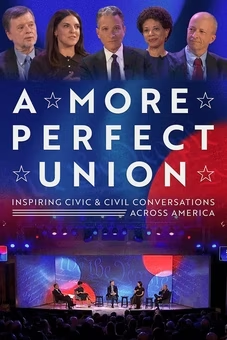










Support for PBS provided by:
Major corporate funding for the PBS News Hour is provided by BDO, BNSF, Consumer Cellular, American Cruise Lines, and Raymond James. Funding for the PBS NewsHour Weekend is provided by...
